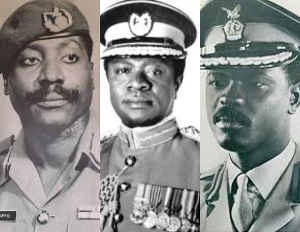When the Media Trust Limited of Nigeria recently invited him as a keynoter, I thought the infamous Butcher-of-Dzelukope would be decent and savvy enough to balk at this transparent bait. Actually, I did not, in any way, expect him to ponder for any remarkable length of time before snatching this quite heady opportunity to see the former neocolonialist dictator delightfully expose himself for the shameless hypocrite and downright charlatan that Mr. Jeremiah John Rawlings is. And true to both form and character, the founding-proprietor of the so-called National Democratic Congress (NDC) did not disappoint.
The copy of the hodgepodge and largely incoherent speech, which the office of the erstwhile Ghanaian strongman released to the press, could well have been written by Dr. Paa Kwesi Nduom, the current presidential candidate of the rump-Convention People?s Party (CPP). For both Flt.-Lt. Rawlings and Dr. Nduom offer strikingly similar definitions of what either politician perceives to be the ideal culture of democracy worthy of practice in Fourth-Republican Ghana. Such striking ideological similarity may well have informed Mr. Sekou Nkrumah?s decision to expediently abandon the rump-CPP for the ballot-shy NDC. Indeed, should it turn out that Dr. Nduom had absolutely nothing to do with the crafting of Mr. Rawlings? ?Abuja Monologue,? then, at the very least, what cannot be gainsaid is the likely fact that the NDC proprietor and/or his minions have been paying sedulous attention to the treacherous campaign speeches of the rump-CPP presidential candidate lately. Regarding the practice of constitutional democracy, for instance, this is what Mr. Rawlings told his Nigerian hosts: ?As a leader whose political party has tasted defeat at the polls before, I can say that there should be nothing to fear in losing an election and therefore there should also be no need to tamper with the rotational principle in good governance? (Ghanaweb.com 1/27/08).
Compare the foregoing with Dr. Nduom?s assertion in Tamale, shortly after being elected flagbearer of the rump-CPP, that Ghana?s Fourth-Republican Constitution stipulates that no political party can rule by the people?s mandate for more than two consecutive electoral terms of eight years. The Komenda-Edina-Eguafo-Abrem member of Ghana?s National Assembly had further added that since both the so-called National Democratic Congress and the ruling New Patriotic Party have enjoyed the electoral mandate of the people during the last 16 years, it was the turn of the rump-CPP to assume the reins of governance.
Needless to say, the preceding is the kind of gimmickry that Mr. Kwame Nkrumah, founder of the proto-CPP, readily got away with during the heady days of the 1950s and ?60s. For instance, Nkrumah is widely reported to have told his supporters, during the frenzied lead-up to Ghana?s reassertion of her sovereignty, that Drs. Danquah and Busia had expressed unreserved preference for British colonial rule, because both distinguished Ghanaian leaders and scholars were quite comfortable with their respective royal, familial heritage.
Interestingly, back in those days of Ghana?s relative political innocence, almost none of Nkrumah?s followers had mustered the requisite courage to demand why purported Anglophiles like Drs. Danquah, in particular, and Busia had actively participated in the founding and operation of the seminal United Gold Coast Convention (UGCC), out of whose fold the pathologically opportunistic African Show Boy founded his ?Convention? People?s Party.
Needless to say, there is absolutely no ?rotational principle in good governance,? if by the latter Messrs. Rawlings and Nduom imply constitutional democracy. For the latter breed of political culture is squarely predicated on the voluntary mandate of the electorate. Strictly speaking, the only thing ?rotational? about democratic governance is the periodic exercise of the right of the electorate to withdraw its mandate from the governors or the executive and the members of the legislative assembly. Even so, there is absolutely nothing ?rotational? about the constitutional right of the electorate to withdraw its mandate from the executive. For the very concept of a rotary political culture ? or ?rotationality? ? erroneously presupposes the conferral of constitutional mandate upon a specific number of political parties or ideological camps, as both Messrs. Rawlings and Nduom appear to be suggesting.
It is also quite interesting to hear the very man who proudly supervised the ethnic cleansing of Akan supreme court judges via raw and brutal assassination pretend to decry what Mr. Rawlings terms as the lack of judicial independence in Ghana. Needless to say, it was their very patriotic and enviably professional pursuit of judicial independence that cost the lives of Justices Koranteng-Addow, Agyepong and Sarkodie. And we know the latter to be an incontrovertible fact because on the very night that the three Akan judges were abducted, another Ewe judge, by the name of Mr. Adzovie, who had been inadvertently arrested, had been promptly released and allowed to live the fullest extent of his lifespan (see SIB Report).
It was also irrepressibly amusing to hear Mr. Probity and Accountability grandstand about the tribalization of African politics, a practice whose very sublimation Mr. Rawlings singularly and uniquely crafted, at least in the postcolonial Ghanaian context.
Then again, it was quite amusing for Mr. Rawlings to claim to be ?grateful? to the Media Trust Limited of Nigeria for according him the ?honor of being invited to this prestigious Dialogue of the Nigerian Press Trust as a Guest Speaker.? I actually thought the man had been invited to Shit-Bomb the Nigerian press, exactly as he had done in Ghana for nearly two decades.
*Kwame Okoampa-Ahoofe, Jr., Ph.D., is Associate Professor of English and Journalism at Nassau Community College of the State University of New York, Garden City. He is the author of ?When Dancers Play Historians and Thinkers,? a forthcoming essay collection on postcolonial Ghanaian politics. E-mail: okoampaahoofe@aol.com.














